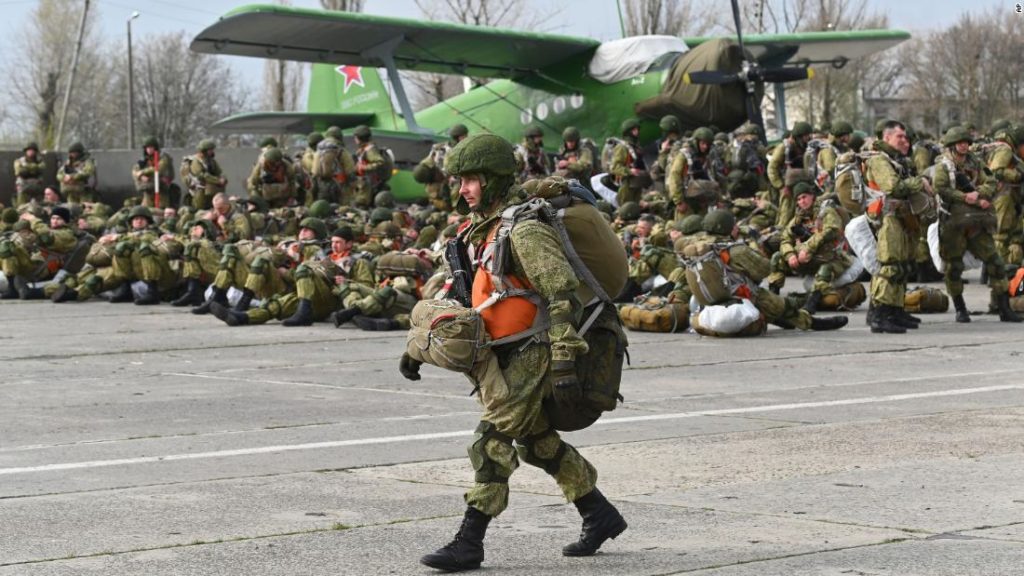A buildup of Russian troops along the border in recent weeks has reignited tensions in eastern Ukraine, where government forces have battled Russian-backed separatists demanding independence from Kiev since 2014.
Russian Defense Minister Sergei Shoigu on Thursday said troops had successfully completed drills near Ukraine and would return to their permanent bases by May 1.
“I believe that the objectives of the snap drill have been fully achieved. The troops have demonstrated the ability to provide a reliable defense of the country,” Shoigu said at a meeting in Crimea, which Russia annexed from Kiev in 2014.
Shoigu’s announcement comes weeks after Moscow initiated the largest buildup of troops near the Ukrainian border since 2014. The European Union estimated Tuesday that more than 100,000 troops had amassed near the border and in Crimea.
It was unclear from Thursday’s announcement how many troops would remain in the region.
State Department spokesperson Ned Price acknowledged Russia’s announcement, saying that the US would continue to closely monitor the situation with Ukrainian officials and other allies, but added that “what we’ll be looking for is action.”
“We have made clear in our engagement with the Russian government that it needs to refrain from escalatory actions and immediately cease all its aggressive activity in and around Ukraine, including its recent military buildup in occupied Crimea, and on Ukraine’s border, and its intention to block specific vessels in the parts of the Black Sea,” Price said at a briefing Thursday.
Conflict Intelligence Team, a Russian open-source intelligence group that has been monitoring Russia’s aggressive military buildup on the border, suggested Thursday that it was too early to judge whether the news amounted to a de-escalation.
On Tuesday, the Russian Ministry of Defense said that more than 20 ships had taken part in exercises in the Black Sea, which borders both countries.
“A unit of ships consisting of frigates “Admiral Makarov” and “Admiral Essen”, small missile ships “Grayvoron” and “Vyshny Volochek”, as well as missile boats, small anti-submarine ships and large amphibious ships conducted an exercise to repel air attack means of a simulated enemy using active electronic jamming and the conditional use of air defense means,” a ministry statement read.
Shoigu, who oversaw the drills in annexed Crimea near Ukraine’s southern border on Thursday, said Russia’s military had to be ready to respond swiftly to any “unfavorable” development given NATO’s ongoing Defender-Europe military exercises.
“Every year in Europe, the Alliance conducts up to 40 major operational training events with a clear anti-Russian focus. In the spring of this year, the combined armed forces of NATO began the most ambitious exercise in the past 30 years,” Shoigu said.
He accused the military and political leadership of Ukraine of seeking to destabilize the situation in the Donbass conflict zone, and said the United States and NATO continued to conduct “provocative activities” in the airspace and waters of the Black Sea.
The NATO alliance has expressed deep concern over the Russian military buildup near Ukraine, described by NATO Secretary-General Jens Stoltenberg last week as “part of a broader pattern of Russian aggressive action.
“Allies fully support Ukraine’s sovereignty and territorial integrity and we call on Russia to de-escalate immediately, stop its pattern of aggressive provocations and respect its international commitments,” he said.
Ukraine has been trying to bolster international support in its deadlock with Moscow, and has urged its Western allies to pledge new sanctions to discourage the Kremlin from resorting to more military force.
In his speech on Tuesday, Zelensky called on Ukrainian citizens to unite in the face of the Russian military threat. “Ukraine and Russia, despite their common past, look to the future differently. We are we. You are you. But this is not necessarily a problem, it is an opportunity. At the very least — an opportunity, before it’s too late, to stop the deadly mathematics of future military losses.”
He blamed Russia for refusing to support a “general statement” to restore a full ceasefire in the area, despite “the support of all parties.”
In his annual address to the nation on Wednesday, Putin warned foreign powers not to cross Moscow’s “red lines,” but made no mention of the military buildup near Ukraine.
Last week, the Ukrainian President met in Paris with French President Emmanuel Macron and German Chancellor Angela Merkel — who joined via video link — to discuss the deteriorating security situation in eastern Ukraine and the occupation of Ukrainian territories. The three leaders ended their meeting calling on Russia to withdraw extra troops amassed on the Ukrainian border.
Reporting contributed by Denis Lapin in Kiev.
You may also like
-
Afghanistan: Civilian casualties hit record high amid US withdrawal, UN says
-
How Taiwan is trying to defend against a cyber ‘World War III’
-
Pandemic travel news this week: Quarantine escapes and airplane disguises
-
Why would anyone trust Brexit Britain again?
-
Black fungus: A second crisis is killing survivors of India’s worst Covid wave

